No Mere Nostalgia, Part II: TRON (1982)
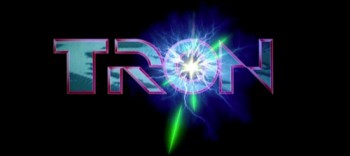 On the other side of the screen, it all looks so easy. . . .
On the other side of the screen, it all looks so easy. . . .
Earlier this year, I marched stolidly at the front of a phalanx to defend the original Clash of the Titans right before its re-make was about to hit theaters. I found the re-make more palatable than I expected, although I have since gotten frosty about it after watching it a second time when the DVD came out; the sucker just doesn’t hold up. Although a sequel to the re-make is now in the works, I think the status of Harryhausen’s 1981 film remains secure. It may even improve.
Now I am facing a similar-sounding situation with this Friday’s looming release of TRON: Legacy. I am here to defend the 1982 film TRON, a movie that balances on a triple-edged knife’s tip of nostalgia, prescience, and ridicule.
However, my position with the new TRON is different than that of the new Clash of the Titans. The forthcoming TRON: Legacy is not a re-make, but a sequel, and this puts me less on the defensive and instead rezzes me up. The early reviews are lukewarm, but at least TRON: Legacy isn’t trying to override the memory of the first movie, and it has brought back the original star Jeff Bridges as well as director Steven Lisberger (in the role of producer this time).
During the early stages of the “New TRON movie” development, Disney did consider doing a re-make, but thankfully someone in the Mouse House realized that a sequel was a better plan. Developments in computer technology between 1982 and 2010 provide an opportunity to explore how the world of computers from the original film have changed — how the grid and the primitive Internet have expanded to rule the world and transform into a reality parallel to our own — and that is fertile ground for a sequel. A sequel almost seems a necessity.
But that TRON: Legacy got made at all is a celebration of one the weirdest, long-term success stories of science-fiction cinema: how a “video-game craze” movie that got a muddy reception on its original release turned into a piece of technical prophecy, an oracle of the modern hi-tech zeitgeist.
Yes, but is it a good movie?
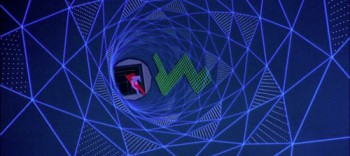 Clearly, I think so. I’m writing this post, after all. But my individual history with TRON is inseparable from my progress through the space-time continuum: I belong to the first generation of children who grew up with personal computers as a part of daily life.
Clearly, I think so. I’m writing this post, after all. But my individual history with TRON is inseparable from my progress through the space-time continuum: I belong to the first generation of children who grew up with personal computers as a part of daily life.
I was just old enough to hold a joystick when the Atari VCS (later renamed the Atari 2600) hit the market. I adored coin-op arcades, can recall the first time I saw a Pac-Man machine, and remember the thrill when my father bought the family an Apple //e. When TRON came out in the summer of 1982, my friends and I thought it was the coolest thing ever. We knew the hype about its computer-generated special effects, and even understood a bit about how it was achieved since we had taken summer-camp classes in LOGO, a shape-drawing language developed for elementary instruction in computer science. Although I was only nine years old during that Summer of ‘82, I felt that that I “got” TRON more than most adults did, and even more than the majority of those mysterious being known as teenagers, at whom the movie was ostensibly targeted. For my friends and I, TRON was a movie about the environment that was surging up around us, constructed in a language we were learning as it grew. We couldn’t articulate yet that that we were the first “digital-children,” and that the information networks, virtual realities, and hacker vs. corporate tyranny themes that are core parts of the movie would turn into core parts of our adulthood.
(By the way, if you wanted to be science-fiction box-office disappointment, 1982 was the place to do it: TRON, Blade Runner, The Thing. Never have low gate receipts paid off so well!)
It was in the early ‘90s, when I was in college, that I began to notice how TRON had called everything right. I wrote a column about the movie for my college newspaper’s entertainment section (i.e. the back page, next to terrible jokes about food service). That review got an enormous response from readers who suddenly pulled TRON back into their consciousness and found that it was an important movie to them as well. I had thought maybe only I cared about TRON, but others were looking back and discovering that with TRON they were actually looking forward, and it caused a giddy feeling of sensing, for a brief moment, that everything make sense.
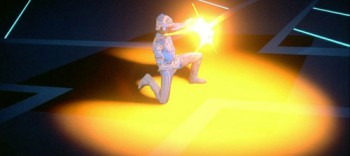 Yeah, but is it a good movie, Ryan? Stop avoiding the question. Yes, it started the development of CGI that now allows for mo-cap blue aliens. Yes, its view of cyberspace is amazingly prophetic. Yes, the issues of electronic freedom in it are more important than ever. But is it good?
Yeah, but is it a good movie, Ryan? Stop avoiding the question. Yes, it started the development of CGI that now allows for mo-cap blue aliens. Yes, its view of cyberspace is amazingly prophetic. Yes, the issues of electronic freedom in it are more important than ever. But is it good?
It’s great. Well, almost. When I propose to you, as per the title of this post, that TRON is no mere nostalgia, I’m admitting to fannish love; but I can still look clear-eyed at the film and see some of the flaws that have led other critics, and a few of my friends, to dismiss it as junk, notable only for its effects and prophetic abilities, but otherwise dismissible nostalgia loved only for the yearning to re-capture the young person who first saw it.
I’ll first address what I think are the film’s flaws:
1.0: Put the money upfront. This is a problem that Disney created, not the creative team. With so much riding on the groundbreaking CGI technology, Disney wanted the movie to open with extensive scenes of it thrown right into the viewer’s face. TRON begins with an uneven leaping between the real world and the computer world, hurling at the audience a lightcycle match (dulling the thrill of the main match later on) and then following with Kevin Flynn sending his program Clu on a file-search mission that puts his tank up against the sinister recognizers. Excellent effects-work, and recognizers are beautiful monsters . . . but thematically it’s a mistake to have the MCP’s world appear suddenly, and it requires a clumsy on-screen title: “Meanwhile, In the Real World.” This puts the film off-balance at the opening, causes confusion with some viewers, and lessens the future-shock of Flynn falling into the strange world on the other side of the screen half an hour later. Lesson here: wait until Alice goes down the rabbit hole before you show Wonderland.
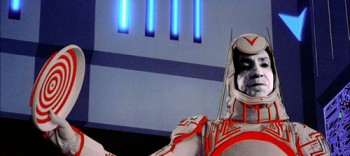 2.0: Pacing. This is the most common complaint I hear about TRON, and the marketing department deserves some blame for this. Disney sold the film in 1982 as “video-game gladiators” — which is similar to earlier concepts for the movie when it was going to be done with hand-animation and no live action. With the video game market of the day booming, it was a natural choice to promote TRON as a “video-game” adventure. But the movie only features the gladiatorial elements for a short time: The Ring Game, the Cross Game, and the Lightcycles. After that, it moves into a journey tale similar to many quest fantasies, as Flynn, Tron (Bruce Boxleitner), and Yori (Cindy Morgan) seek to cross the Grid to destroy the MCP and create a free system. While Flynn gets some great material — driving an out-of-control recognizer while arguing with “Bit” — Yori and TRON have much more staid and slow-moving sections. Tron at the I/O tower is a magisterial and mystical sequence… but it does test some people’s patience to sit through. The finale at the MCP tower gets off to sluggish start, until Tron and Sark face-off.
2.0: Pacing. This is the most common complaint I hear about TRON, and the marketing department deserves some blame for this. Disney sold the film in 1982 as “video-game gladiators” — which is similar to earlier concepts for the movie when it was going to be done with hand-animation and no live action. With the video game market of the day booming, it was a natural choice to promote TRON as a “video-game” adventure. But the movie only features the gladiatorial elements for a short time: The Ring Game, the Cross Game, and the Lightcycles. After that, it moves into a journey tale similar to many quest fantasies, as Flynn, Tron (Bruce Boxleitner), and Yori (Cindy Morgan) seek to cross the Grid to destroy the MCP and create a free system. While Flynn gets some great material — driving an out-of-control recognizer while arguing with “Bit” — Yori and TRON have much more staid and slow-moving sections. Tron at the I/O tower is a magisterial and mystical sequence… but it does test some people’s patience to sit through. The finale at the MCP tower gets off to sluggish start, until Tron and Sark face-off.
3.0: Some dopey lines. And poor Danny Shor as Ram gets most of them. “Oh, my user!” A few other lines do clunk (“Sending me down here to play games! Who does he calculate he is?”) but far less than I think detractors would have people believe.
Here is what I think is great about TRON, factors that I believe more than compensate for the above problems:
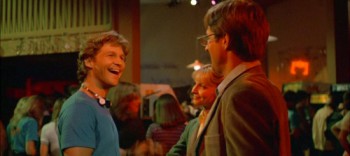 1.0: Jeff Bridges is Kevin Flynn. And Flynn lives! The pairing of the young Bridges with the role of the outlaw hacker, a too cool for his own brain rebel, was the smartest creative move anybody at Disney made regarding TRON. The visual effects may be revolutionary, but it takes a performer like Bridges, a natural for out-there material, to make us believe that it’s all happening. Or, in Flynn’s own words, “This isn’t happening, it only thinks it’s happening.” Jeff Bridges makes me think it’s happening.
1.0: Jeff Bridges is Kevin Flynn. And Flynn lives! The pairing of the young Bridges with the role of the outlaw hacker, a too cool for his own brain rebel, was the smartest creative move anybody at Disney made regarding TRON. The visual effects may be revolutionary, but it takes a performer like Bridges, a natural for out-there material, to make us believe that it’s all happening. Or, in Flynn’s own words, “This isn’t happening, it only thinks it’s happening.” Jeff Bridges makes me think it’s happening.
2.0: David Warner is Dillinger – Sark – The MCP. A good melodrama needs a villain, and here he is: one of the most charismatic and sinister of all British characters actors in the double role of the conniving “suit” Dillinger and his computer-world counterpart, “Command Unit Sark.” As Dillinger, Warner is cold and sinister, and has a riveting scene where he tears apart Walter (Barnard Hughes), one of the “old guard” at the company that Dillinger has casually turned into a heartless monster. As Sark, Warner is fierce and cocky, and can even spit out the insult “null-unit” to one of his flunkies and make it sound convincing. And yes, that is David Warner’s voice — computer altered — speaking as the Master Control Program.
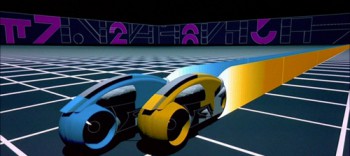 3.0: The Lightcycles. An action scene that still looks phenomenal after almost three decades. The kinetic colorful thrill of the six vehicles flashing across the new digital cinema landscape. Salute the future!
3.0: The Lightcycles. An action scene that still looks phenomenal after almost three decades. The kinetic colorful thrill of the six vehicles flashing across the new digital cinema landscape. Salute the future!
4.0: Wendy Carlos. I have already purchased and listened to Daft Punk’s score to TRON: Legacy, and I think it is astonishing. It’s especially refreshing considering what it has to live up to: Wendy Carlos’s texturing of orchestral color with heavy electronics. Carlos is one of the innovators of electronic music, but for TRON she created one of the best meldings of traditional acoustic instruments with synthesizers, creating a sort of “Concerto for Moog and GDS Synthesizers and Orchestra.” I’ve come across online information claiming that Disney forced the orchestra onto Carlos, feeling that she wouldn’t have the time to complete the electronic music, but this contradicts what the composer herself wrote on the 2001 CD soundtrack release liner notes: “Initially, they asked me if I’d be willing to provide the electronic music portions for the TRON world inside the computer. But, hey, I’d studied composition, along with orchestration, harmony, and counterpoint, but then unfortunately became pigeon-holed as a ‘synthesist’ of Baroque music of all things! I wanted the fun of writing ‘real’ music again, for full orchestra and chorus, as well as several varieties, why not?” Carlos’s experiment, which involved pioneering several computer systems to synchronize the music, created one of the best scores of the decade. Even though electronic music has become dominant in film music, there still isn’t anything since that sounds like what Wendy Carlos wove for TRON.
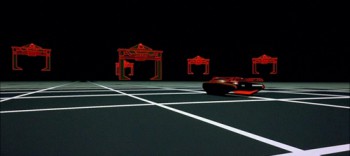 5.0: The never-repeated look. TRON is a piece of abstract futuristic beauty, like a cyberpunk re-make of Barry Lyndon. Every frame in the computer world is a work of art. But while TRON proved the power of CGI as a tool in movie making, it also has a style that no one else will ever be able to reproduce. It isn’t only because the technology available has matured; it’s because TRON is essentially a one-off in the technique it used to combine the live footage with the effects work.
5.0: The never-repeated look. TRON is a piece of abstract futuristic beauty, like a cyberpunk re-make of Barry Lyndon. Every frame in the computer world is a work of art. But while TRON proved the power of CGI as a tool in movie making, it also has a style that no one else will ever be able to reproduce. It isn’t only because the technology available has matured; it’s because TRON is essentially a one-off in the technique it used to combine the live footage with the effects work.
Disney heavily pushed the digital aspect of the film on its release, making it seem as if all the scenes in the MCP’s world were done with CGI. (When I was nine I believed that, aside from the actors, the film’s look was achieved wholly with a computer.) In truth, only about 20% of the film’s footage uses effects from the various digital imaging companies that signed on to produce the work. Most of the backgrounds in scenes using the actors are beautiful airbrushed paintings designed to match the look of the CGI creations — and achieved it well enough to fool many people. The live-action footage was shot in black-and-white on featureless black stages, and then brought to life through “backlit animation” — an immensely time-consuming process involving multiple passes of separate elements of the film and hand-coloring of skin-tone and eyes on each frame. A large amount of hand-done effects animation was used as well, such as the flying discs used in the Cross Game. This mix of techniques would never be used again, and it makes TRON visually stand out.
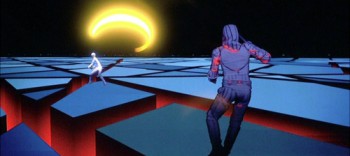 6.0: The Digital Prophet. I’ve already discussed how prescient a film TRON is, and why shouldn’t this also count as reason for its greatness? This is not nostalgia — we had to catch up with the movie.
6.0: The Digital Prophet. I’ve already discussed how prescient a film TRON is, and why shouldn’t this also count as reason for its greatness? This is not nostalgia — we had to catch up with the movie.
I could list many more details about the film that I love — each piece of design deserves its own entry — but that would stick us here for 1500 micro-cycles. So to more succinctly sum up, I think TRON stumbles with its own ambition in sections but emerges as an excellent combination of groundbreaking visuals, two great performances, and a storyline that does justice to the concept of the effects. It holds up, and not just because it saw the future.
See you next week for the TRON: Legacy review. Early reviews are mixed; I want something wonderful, but I’ll settle for good.
END OF LINE
(You expected that.)
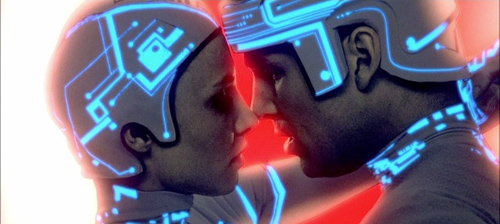
Ryan, you and I are almost exactly the same age, and have almost exactly the same feeling about Tron. I loved the movie, especially the Jean Giraud designs (actually, I think I liked the opening in the computer world; the back-and-forth with Flynn and Clu seemed to me to succinctly explain how the computer world worked, which would have been an awful lot to absorb along with Flynn — the first time we’d see Tron, we’d be thinking “hey, what’s Alan doing here?” and possibly be confused well into the light-cycle scene; and we’d also be seeing light-cycles for the first time, too). Plus, it’s one of the oddest Christ parallels I’ve ever seen, which gives it an unlikely-but-effective resonance.
(And was David Warner in every SF franchise running, back then? He was in two Star Trek movies, Tron, Twin Peaks, Babylon 5, the Batman Animated Series … a busy, busy man.)
Ryan… I have to wonder, is everyone who currently Blogs for BG between the ages of 35-42? If so, I think Tron is loved by us all, although I did buy a copy of the movie in the early 2000s and had to stop half-way through because I could take no more. Does that mean I love it any less? No, but I would think it’s like going back and reading Dragonlance [which I refuse to do] as it just wouldn’t hold up to the person I’ve become, although the boy inside will love it till he gets buried along with this wrinkled and aged body.
I’ve already made a date with my father-in-law to see it on Friday, and although I’m sure it won’t mean what the first one did to me, I’m happy its out there and that I can take a moment to remember innocent days in the sun.
I watched it again last night, or should I say I attempted to watch it again last night. No, its not a good movie, pretty much in any way its not a good movie…
Well, it was better than the last three Star Wars movies. If I watched it a 2nd time I think I’d be less impressed, but it was a darn pretty movie, good acting, and Olivia Wilde was perfect in her innocence. Well done Disney.
I wasn’t that impressed with Legacy, but I’ll have plenty more to say about that on Tuesday.
Hmmmm, well Ryan, you know we both live in L.A., just close enough to have a duel about which Tron was better… What say you, lightcycles at dawn on Redondo Beach, Avenue C? 🙂
My user won’t let me. He wants me to go after the MCP. 🙂
I didn’t see the original, computer science-themed films or books are not appealling for me, but I remember in Spain were a collection of a kind of trading cards, cromos we call it in Spain, inside little chocolate pies
and what about the white goddess Cindy Morgan and Bruce Boxtleitner, mayb e this was a kind of vehicle with the objective of take them from tv shows to films, they worked together in the tv show Bring them all alive